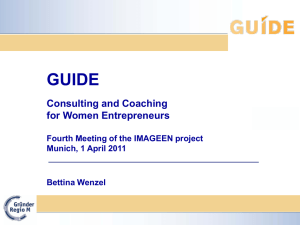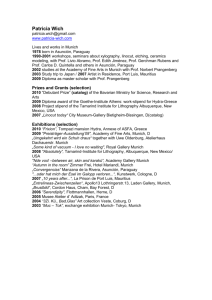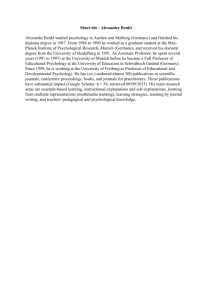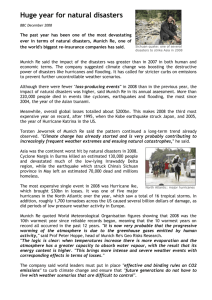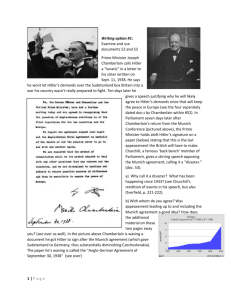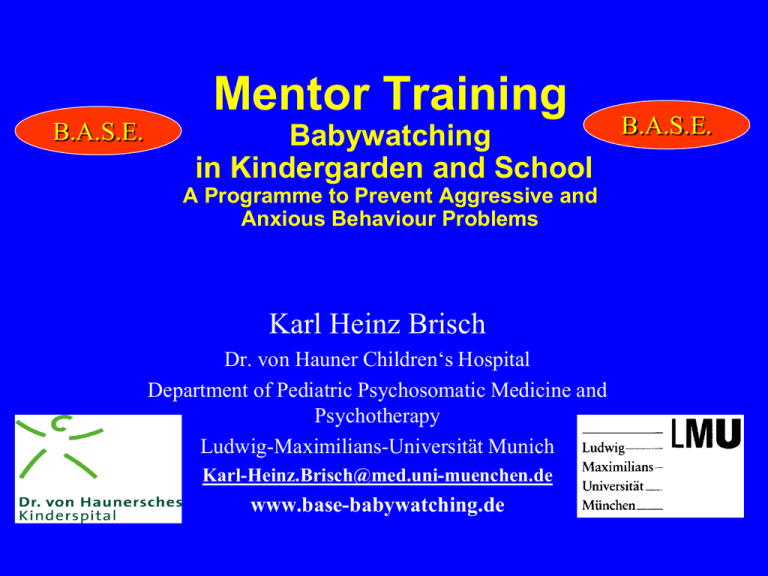
Mentor Training
B.A.S.E.
B.A.S.E.
Babywatching
in Kindergarden and School
A Programme to Prevent Aggressive and
Anxious Behaviour Problems
Karl Heinz Brisch
Dr. von Hauner Children‘s Hospital
Department of Pediatric Psychosomatic Medicine and
Psychotherapy
Ludwig-Maximilians-Universität Munich
Karl-Heinz.Brisch@med.uni-muenchen.de
www.base-babywatching.de
®
B.A.S.E.
Babywatching
in
Kindergarten and School
B = Babywatching
A= Against Aggression and Anxiety
S = For Sensitivity
E = For Empathy
www.base-babywatching.de
www.base-babywatching-uk.org
Homepage
www.khbrisch.de/en
• Downloads
– Slides of presentation –
BASE_Mentor_London
• www.base-babywatching-uk.org
• www.base-babywathing.de
• www.base-babywatching-frankfurt.de
© Copyright K. H. Brisch Munich/Germany 2013. All rights reserved.
Overview
•
•
•
•
•
•
BASE-formation Stages
Tasks of BASE Mentors
Errors during Implementation of BASE
Sensitivity Training
Video Clips
Roots of Empathy - Programme
© Copyright K. H. Brisch Munich/Germany 2013. All rights reserved.
Training Stages of BASE
• Group Leader – leads BASE Groups
• Mentor – „Advisor" für BASE Groups
• Trainer – Teacher for BASE Group Leaders
© Copyright K. H. Brisch Munich/Germany 2013. All rights reserved.
Mentor
• „Trusty Advisor"
• Tutor – helps first-year Students
© Copyright K. H. Brisch Munich/Germany 2013. All rights reserved.
Requirements for Mentors
• Own experience with BASE
– Implementation of Group
– Participating in Group Watching
• Candidates for BASE Mentor
– Group Leader
– BASE Mothers? After Group Leader Training
– Other Professional Groups after Participating in
Watching
© Copyright K. H. Brisch Munich/Germany 2013. All rights reserved.
Tasks of Mentors
• Answering Questions regarding Theory
of Aggression according to Henri Parens
– Development of Empathy
– Sensitivity
– Research Results
© Copyright K. H. Brisch Munich/Germany 2013. All rights reserved.
Tasks of Mentors
• Advertisement for BASE
–
–
–
–
–
Approach Kindergardens and Schools
Motivation Phase
Distribute Information
Approach Group Leaders
Motivate to make BASE Formation
© Copyright K. H. Brisch Munich/Germany 2013. All rights reserved.
Tasks of Mentors
• Guidance in Implementation of the Programme
–
–
–
–
–
–
Information and assistance during Parents‘ Evening
Assistance in Information for Children
Looking for a Mother/Father with Baby
Counselling of Group Leaders during Start
Help with correct Implementation of the Programme
Feedback to the Group Leaders
© Copyright K. H. Brisch Munich/Germany 2013. All rights reserved.
Tasks of Mentors
• Counselling of Group Leaders in Case of
Problems with
–
–
–
–
–
–
Mother
Baby
Mother-Child-Interaction
Children in the Watching Group
„Difficult" Child
Parents
© Copyright K. H. Brisch Munich/Germany 2013. All rights reserved.
Aggression Theory
according to Henri Parens I
• Types of Aggression
– Positive healthy Aggression as „Exploration“
– Negative hostile Aggression against Others
© Copyright K. H. Brisch Munich/Germany 2013. All rights reserved.
Aggression Theory
according to Henri Parens II
• Cause of Hostility
– Massive Rejection and Disregard of Basic
Needs of the Child by Caregivers
– Missing Empathy in Thoughts, Feelings and
Actions of Children
© Copyright K. H. Brisch Munich/Germany 2013. All rights reserved.
Vital Needs
Physiological
Needs
Attachment
Exploration
Relationship
Sensorysexual
Stimulation
Avoidance of
negative stimuli
Self-efficacy
© Copyright K. H. Brisch Munich/Germany 2013. All rights reserved.
Window of Stress Tolerance and Affects
Hyperarousal Sympathetic Nervous System Dissociation
FREEZING
Panic
Fear of Death
Activated Bonding Need
+
Hyperarousal Parasympathetic Nervous System Dissociation
RELAXATION/COLLAPS
© Copyright K. H. Brisch Munich/Germany 2013. All rights reserved.
Modifiied according to Lutz Ulrich Besser © Copyright Besser 2008
Kindergarden Programme
Babywatching I
• Group of Children watching an Infant in
Interaction with his/her Mother
• Starting shortly after Birth till approx. End
of first Year
• Up to autonomous Walking and first Words
© Copyright K. H. Brisch Munich/Germany 2013. All rights reserved.
Prevention Programme
• Goals
– Ability for Empathy
– Preventing Hostility
• Modules for Pupils and Teachers
– From Kindergarten to Grade 12
• Significant Reduction of aggressive
Behaviour in Comparison to Control
Groups
© Copyright K. H. Brisch Munich/Germany 2013. All rights reserved.
Kindergarden Programme
Babywatching II
• Instruction for Babywatching by Educators
• One Educator leads the Group, while another leads
the Watching
• Monitoring of Protocol
• Frequency
– 1 x weekly
– Circle of Chairs
• Duration approx. 20-30 minutes
© Copyright K. H. Brisch Munich/Germany 2013. All rights reserved.
Results I
• Behaviour Assessment of the Children
(N=50, Age M=50 Months) by
– Educators
– Parents
• Test at Start and Finish of Intervention
• Comparison between Control Group
(without Intervention) and Intervention
Group
© Copyright K. H. Brisch Munich/Germany 2013. All rights reserved.
Results II
• Improvements in the Intervention Group
– Assessed by Educators (CBCL)
• Boys
–
–
–
–
–
–
Less aggressive Behaviour
Less oppositional Behaviour
Improved Altertness
Less social Withdrawal
More emotional Reactivity
Less „anxious-depressed“
© Copyright K. H. Brisch Munich/Germany 2013. All rights reserved.
Results III
• Improvements in the Intervention Group
– Assessed by Educators (CBCL)
• Girls
–
–
–
–
–
Less Sleeping Problems
Improved Alertness
Less social Withdrawal
More emotional Reactivity
Less „anxious-depressed“
© Copyright K. H. Brisch Munich/Germany 2013. All rights reserved.
Results IV
• Improvements in the Intervention Group
– Assessed by Parents (CBCL)
• Boys
–
–
–
–
Less aggressive Behaviour
Improved Alertness
Less social Withdrawal
More emotional Reactivity
© Copyright K. H. Brisch Munich/Germany 2013. All rights reserved.
Results V
• Improvements in the Intervention Group
– Assessed by Parents (CBCL)
• Girls
–
–
–
–
Less Sleeping Problems
Improved Alertness
Less social Withdrawal
More emotional Reactivity
© Copyright K. H. Brisch Munich/Germany 2013. All rights reserved.
Results VI
• Additional Improvements in the
Intervention Group
• Assessed by Educators
– Attachment Behaviours
• Looking for Comfort from Caregiver
– Applying the Method of Babywatching and
Sensitivity of Play with one Another
© Copyright K. H. Brisch Munich/Germany 2013. All rights reserved.
Summary
• Overall positive Effect for both Boys and
Girls
• Positive Changes of externalising and
internalising Disturbances
• Similar positive Assessments made by
Educators and Parents
© Copyright K. H. Brisch Munich/Germany 2013. All rights reserved.
Summary II
• For all Involved, an emotionally positive
Experience
• Noticeable Generalisation of the Mode of
Babywatching during Play with one
Another
• Preventive Intervention at minimal Cost
© Copyright K. H. Brisch Munich/Germany 2013. All rights reserved.
Training of Empathy
• Sensitivity for other People‘s
–
–
–
–
Thoughts
Actions
Motivations
Feelings
• Self reflective Capacity of Mentalizing
– „I think that you think that I think…“
– „I feel that you feel that I feel…“
© Copyright K. H. Brisch Munich/Germany 2013. All rights reserved.
Sensitivity (1)
• The Caregiver with the highest Sensitivity
during Interaction will become the Infant‘s
major Attachment Person.
• A high parental Sensitivity will enhance the
Developmenht of a secure Attachment of
the Infant.
© Copyright K. H. Brisch Munich/Germany 2013. All rights reserved.
Sensitivity (2)
• The Caregiver has to
– Perceive the Infant‘s Signals
– Interpret correctly the Infant‘s Signals
– React properly
– React promptly
To the Infant‘s Signals
© Copyright K. H. Brisch Munich/Germany 2013. All rights reserved.
The Importance of Language
between Mother/Father and
Infant
• Enhancement of a secure Attachment
by Designation
– Of the Infant‘s Actions
– Of the „inner Feeling“ of the Infant
– Of the Creation of Contexts
© Copyright K. H. Brisch Munich/Germany 2013. All rights reserved.
Rhythm of Interaction
in Action and Language
• Support of secure Attachment by
– Reciprocal Change in Mother-Infant-Interaction
and Communication
– Correction of Mismatches
• Insecure Attachment
• Via hyper-synchronous Interaction and
Communication
– Absolutely asynchronous Interaction
© Copyright K. H. Brisch Munich/Germany 2013. All rights reserved.
Gaze
• Reciprocal Gaze with Affect Attunement
between Infant and Caregiver promotes
secure Attachment (Intersubjectivity)
© Copyright K. H. Brisch Munich/Germany 2013. All rights reserved.
Touch
• Sensitive Touch/massage between Infant
and Caregiver promotes secure Attachment
© Copyright K. H. Brisch Munich/Germany 2013. All rights reserved.
Levels of Babywatching
•
•
•
•
•
Behaviour
Motivation
Emotion
Identification
Empathy
© Copyright K. H. Brisch Munich/Germany 2013. All rights reserved.
Level of Babywatching I
• Level of Behavour
– What does the Baby do?
– What does the Mother/Father do?
© Copyright K. H. Brisch Munich/Germany 2013. All rights reserved.
Level of Babywatching II
• Level of Motivation
– Why does the Baby behave in this Way?
– Why does the Mother/Father behave in this
Way?
© Copyright K. H. Brisch Munich/Germany 2013. All rights reserved.
Level of Babywatching III
• Level of Emotions
– How does the Baby feel in this Situation?
– How does the Mother/Father feel in this
Situation?
© Copyright K. H. Brisch Munich/Germany 2013. All rights reserved.
Level of Babywatching IV
• Level of Identification with Behaviour
– What would I do in this Situation, if I was the
Baby?
– What would I do in this Situation, if I was the
Mother/Father?
© Copyright K. H. Brisch Munich/Germany 2013. All rights reserved.
Level of Babywatching V
• Level of Identification with Emotions• Level of Empathy
– How would I feel in this Situation, if I was the
Baby?
– How would I feel in this Situation, if I was the
Mother/Father?
© Copyright K. H. Brisch Munich/Germany 2013. All rights reserved.
Errors during Implementation
• Mother/Father sits on a Chair and puts Baby
in the Middle of the Room for Watching
• No Mother/Father-Infant-Interaction
• Children interact with Baby
• Baby is passed around
• Group Leader focuses on the Infant‘s
Behaviour, but not on Interaction
© Copyright K. H. Brisch Munich/Germany 2013. All rights reserved.
Errors during Implementation
• Group Leader changes BASE to a
developmental Psychology Course and
retrieves Knowledge
• Children hop around the Group
• Restless, difficult children have to be cared
for more intensively by the group leader:
Eye Contact, Closeness, Follow-up Care
© Copyright K. H. Brisch Munich/Germany 2013. All rights reserved.
Remember: Pitfall and failures
•
•
•
•
•
•
•
No programme of developmental psychology
No teaching with blackboard
No teacher – caring for baby
No student – touching, holding, cudling the baby
No focus on baby only and developmental steps
BUT always:
Focus is on mother/father-infant-interactions
© Copyright K. H. Brisch Munich/Germany 2013. All rights reserved.
Problems
• Mother/Father show psychological Strain
• Postpartal Depression: Mother
–
–
–
–
Does not talk,
Depressive Affect,
Does not interact with Infant
Looks bored
• Insensitive Mother/Father-Infant-Interaction
• Help is needed
• Referral to Mother-Child-Counselling
© Copyright K. H. Brisch Munich/Germany 2013. All rights reserved.
Special Highlights
• Father attends Babywatching
• Especially sensitive Mother
• Infants experience first motor skills such as
Turning, Crawling, Walking
• Infants experience their first Words
© Copyright K. H. Brisch Munich/Germany 2013. All rights reserved.
Roots of Empathy
•
•
•
•
•
•
Canadian Programme – Mary Gordon
Infant Development
Teaching Book
Baby and Mother visit ones a months
Handling the baby, touching, cudling
Results – research papers
– No clear methods, results to doubt
• See critical report in the internet
•
•
Making money
Benefit not clear from research results
– http://travisithompson.net/frequentquestions/page84/
© Copyright K. H. Brisch Munich/Germany 2013. All rights reserved.
DVD „Babywatching“
• BASE in Kindergarden
• BASE in School
• www.BASE-Babywatching.de
© Copyright K. H. Brisch Munich/Germany 2013. All rights reserved.
®
B.A.S.E.
Information about the
Formation
B.A.S.E.-Group Leader or
Mentor
www.base-babywatching.net
©
SAFE
SAFE ATTACHMENT
FORMATION FOR ECUCATORS
June 3-6, 2013 Munich/Germany
A training program to enhance secure attachment between
parents and child
Karl Heinz Brisch
Dr. von Hauner Children‘s Hospital
Department of Pediatric Psychosomatic Medicine and
Psychotherapy
Ludwig-Maximilians-Universität Munich
Karl-Heinz.Brisch@med.uni-muenchen.de
SAFE
- Mentor
Multiplikatoren
-
• Formation in SAFE für persons who work with
pregnant women, parents and infants.
–
–
–
–
–
–
–
–
Pregnancy consultants
Midwives and lactation consultants
Nurses
Obstetricians
Psychologists
Pediatricians
Child and Adolescent Psychotherapists
Speech Therapists
© Copyright K. H. Brisch Munich/Germany 2013. All rights reserved.
International Conference
October 11-13, 2013 in Munich/Germany
Attachment and
Psychosomatics
Information and Programme
Email to:
geber-reusch@t-online.de
www.khbrisch.de
Future Prospects
•
•
•
•
•
More Propagation and Testing
Testing in inner-city Areas
Testing with other Age Groups
Scientific Supervision
Research
© Copyright K. H. Brisch Munich/Germany 2013. All rights reserved.

